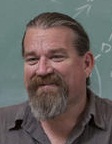Jeff MacSwan | |
|---|---|
 MacSwan (2008) | |
| Born | Los Angeles, California, United States |
| Spouse | Dr. Kellie Rolstad (1996-present) |
| Children | Three |
Jeff MacSwan is an American linguist and educational researcher, working in the United States. He is currently Professor of Applied Linguistics and Language Education in the Division of Language, Literacy, and Social Inquiry in the Department of Teaching and Learning, Policy and Leadership at the University of Maryland. [1] He is also Professor in the Neuroscience and Cognitive Science Program there, and Affiliate Professor in the University of Maryland Linguistics Department and Center for the Advanced Study of Language. He is a Fellow of the American Educational Research Association (AERA) [2] and of the National Education Policy Center (NEPC). [3]
MacSwan's applied research program is focused on the role of language in learning and on education policy related to bilingual learners in US schools. MacSwan also conducts basic scientific research in bilingualism, with a focus on the study of bilingual codeswitching. He has achieved national and international notoriety for his contributions in both areas. He is the author of numerous publications, and the editor of the International Multilingual Research Journal. [4]